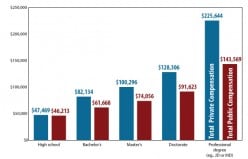Just the facts, please
Are Wisconsin's state and local workers overpaid?
By Ezra Klein
"Republicans say that public-sector employees have become a privileged class that overburdened taxpayers," write Karen Tumulty and Brady Dennis. The question, of course, is whether it's true. Consider this analysis the Economic Policy Institute conducted comparing total compensation --that is to say, wages and health-care benefits and pensions --among public and private workers in Wisconsin. To get an apples-to-apples comparison, the study's author controlled for experience, organizational size, gender, race, ethnicity, citizenship and disability, and then sorted the results by education."
http://voices.washingtonpost.com/ezra-k … local.html
I wish this graph copied larger. The blue line shows total compensation for private sector employees in Wisconsin - the red line shows compensation for government employees.there are 5 comparisons - what does each stand for?
I apologise for the grainy graph.
From left to right -
High School - Bachelor - Masters - Doctorate - Professional Specialty, like MDstill the purveyor of untruth, i see.
http://www.usatoday.com/news/nation/201 … 1_ST_N.htm
Here are facts that dispute your facts which of course aren't facts at all because your source is an extreme left group looking to support the union agenda...try using common sense... what good would it be to be in a union that couldn't get you better pay than the private sector?? Really... you need to question things not just accapt them because they match your political beliefs.I love it when you prove my point, LaLo. If you had the reading comprehension skills of a turnip, you would have understood.
I quote from your source, USA Today.
"Wisconsin is typical. State, city and school district workers earned an average of $50,774 in wages and benefits in 2009, about $1,800 more than in the private sector..
The analysis included full and part-time workers and did not adjust for specific jobs, age, education or experience. "
Do the math, sweetie. The average public employee makes $150 per month more than average private sector employee. Go to the next statement. The study did NOT adjust for education. Roughly half of government employees have college degrees - twice the rate in the private sector. So any objective study that looks at total compensation including level of education compared to the private sector will find government employees are paid LESS THAN THE PRIVATE SECTOR.
My OP said so as did the article you supplied. Facts can be a real... pregnant pup.Look at the RATE of growth public vs private... in the public sector its been explosive driven by lucrative retirement and health benefits.
http://www.usatoday.com/news/nation/201 … -pay_N.htm
Here is another comparison that actually looks at particular jobs and clearly the feds pay way more! Then the union in rebuttal claims you have to look at the actual duties! Lol! It seems there is always some way to parse the data to get a desired result... but you want us to believe your union has been ineffectual in getting you any benefit better than non union... you want us to believe the entity that paid 800 dollars for a hammer isn't paying too much for labor? Ya right!
Thank you. (the text is too small, lol)
First off, I'd like to say that this is a graph representing the average from the entire US, which I understand as my last job paid roughly $26,000/yr for my HS Diploma, and current job postings pay $30-35,000/yr for a Bachelors degree.
As we are discussing Wisconsin, here are some facts for chewing:
(provided by: http://quickfacts.census.gov/qfd/states/55000.html
Wisconsin has a population of 5,654,744 living in 2,084,588 households with a median income of $52,103/yr.
23.2% of the population is under the age of 18, while 13.5% are over the age of 65. 790,917 persons, over the age of 5, are disabled. (wonder how many are disabled adults drawing SSI b/c they're unable to work....) And, 10.5% of the state population lives below poverty.
So, out of 2,084,588 households, 300,000 are state employees (compensated through taxes collected). That leaves 1,784,588 households to cover the incomes of state employees. However, the 13.5% of the population that is over the age of 65 can come off this total, seeing as how age 65 is the age of retirement. Most people age 65 and over will be retired. So...1,784,588 minus 763,390 (13.5% of the entire state population) equals 1,021,198.
Now we still have 10.5% of the state population living below poverty, so...1,021,198 minus 593,748 (10.5% of the entire state population) equals 427,450.
Do you see the problem here? How many of this 427,450 people of the state of Wisconsin do you think have more than a high school diploma? How many have a Bachelors degree? Or, a PhD? Well, let me tell you this much: 85.1% of the state population has a high school diploma, while 22.4% have a Bachelors degree.
Okay, so now we have this information: 427,450 people are responsible for providing the incomes of 300,000 state employees. Hmm, wonder how they do it?However, those 300,000 do pay taxes so think how much more the 427,450 would have to find if instead of paying (some) of the wages of those 300,000 they had to pay for them to be unemployed. Consider also how much those 300,000 spend at present and how much they would spend if unemployed?
How many businesses do those 300,000 support and how many of those businesses fail without the spending of 300,000?
There would be considerably fewer people paying into the pot and considerably fewer businesses paying into the pot too!You make a good point John. Conservatives always fail to see that public salaries are taxed, public employees spend money in the very private economy, etc. The argument that these public salaries paid go down a rat hole is just short-sighted and naive.
Yes, we had a classic example of that in the 80s here.
The government decided that they would cut public spending by cutting government jobs.
As a result public spending didn't decrease, it increased!Oh, and here I thought people failed to see that public expenses include police vehicles and firetrucks (including supplies for maintenance & repairs - which aren't free), schoolbooks, electricity, property or liability insurance, uniforms, building maintenance supplies, gas for vehicles, paper, computers, printers, ink, projectors (do they still use them? lol), VCR's, televisions, chalk, cleaning supplies, buses, road construction, and any other public works project that cares to come along for a piece of the pie.
Yes I was overlooking that and just focusing on the loss of wages and the effect on the economy!
I'd forgotten about all the public money ploughed into the economy, the cost of the fire engines, the supplies for maintainance and supplies, and all the other things you mentioned, all or almost all sourced from private enterprise and making a huge contribution to the economy.Oh! And, lawnmowers, snowplows, salt, hedge trimmers, weed-eaters, garbage trucks, recycle trucks, new parking meters (or replacements, whichever fits), road paint, telephones (cell phones??), guns, bullets, bullet-proof vests, heating & air conditioning, beautification projects (because it's really super important for public grounds to look their best when 25,000-100,000 protesters bring your state capital to national TV), stop-lights, road signs (new or replacements), desks, chairs, office cubicles, and special circumstance costs (overtime for the several police departments working daily crowd control for the 25,000-100,000 protesters over a two-week period of time, maintenance & repair for the same reasons which is in addition to the normal maintenance & repair).
You are deliberately distorting the numbers, mixing households and individuals with fuzzy math. As John pointed out, Wisconsin state employees pay taxes so you can't exclude them.
Now let's quick check your numbers because they don't add up. You start with a Wisconsin population of 5.5 million. You exempt half (roughly) as taxpayers by age, disability, or poverty. That makes 2.75 million eligible cheesehead taxpayers. If 20% are unemployed that leaves 2.2 million cheesehead taxpayers to provide income for 300,000.
The ratio of state employees to citizens of Wisconsin 1 in 19.(try asking questions rather than making assumptions, okay?)
No, not deliberately, mistakenly. I began with the entire state population because numbers can be misleading. (why can't 5 million people support 30,000 teachers??)
The state population is divided into 2,084,588 households with a median income of 52,103. (public and private mixed, along with disabled and retired)
I subtract the total of state employees (first mistake, but there is a reason) because whether one state employee lives with another is irrelevant. I took the liberty of providing state employee taxes paid into the funds for anything other than wages & benefits. (see above post regarding other gov expenses)
Similar issue with the retired citizens - I'm not about to quibble over whether all retired citizens are married to one another, divorced, widowed, or married to a non-retired citizen.
Now, to your miscalculation. You state the number of taxpayers in Wisconsin to be 2.75 million. You came up with this number through my exemptions, however, you failed to check the link I provided which states: there are 2,084,588 households with a median income of 52,103. If you treat each household as a single taxpayer, then you can understand what I'm saying. (that's where I got confused because the median income applies to households, not individual taxpayers)
Also, according to your math, one citizen would be responsible for paying 2742 in taxes to contribute to the salary of one state employee. However, I think it's well known that come time to file income tax there are a significant number of citizens who don't earn enough money to be required to pay taxes and get a refund instead. (and, according to a median income of 52,103, I'd say that number is higher than the number of citizens who earn enough to pay the full amount of taxes owed without loopholes, credits, and exemptions) Therefore, that 2742 just shot up in proportion to how many citizens get a refund.Too simplistic, you make no allowance for the contribution made by state employees, nor the contribution made by businesses.
I'm not going to wade through the contortions you went through to create a ridiculous number. I'm going to simplify the equation so anyone can see it's false. Rationalize to your hearts content.
Your numbers don't make rational or arithmetic sense. Mine do.Your arguments also fail to include the tax contribution of business.
I'm assuming corporate taxes would cover the $900 million school budget that the governor wants to axe. (that $900 million isn't coming in for a reason....)
My intention isn't to go through the entire budget of taxes and allocations. That would be ridiculous! The fact of the matter is this:
Money doesn't grow on trees and its about time that state employees grew up and understood this in order to find ways to live and work responsibly rather than continuing to pass the buck to the average taxpayer who struggles just to get by.Your intention seems to be distortion and confusion. I think employees of the government should earn a fair wage compared to their counterparts in the private sector. This means you have to factor in education. A much higher percent of government employees have degrees than the private sector. You don't hear government employees say, "Will that be paper or plastic?"
The average wage of the average government worker is higher than the average wage of a worker in the private sector. That statistic works well for the demogogue until you factor in education. The average government employee with a degree makes LESS than the average private sector with a degree.public employees should be the FIRST thing cut when budgets start to fall.
What you fail to understand is that with a growing public employee pool soon there wont be anyone left to tax to pay the public employees.
Where did you establish that the government labor pool is growing?
But as the government sack workers surely the labour pool is shrinking, not growing?
The labor participation rate is the lowest its been in 25 years which is why the unemployment rate is dropping... however public employees have been immune supported by the Obama stimulus billS.
So what are you saying? That government labour is increasing by comparison, or increased government employment has reduced unemployment?
Larbor participation is the measure of people looking for work if you have less people looking (or not counted) the unemployment rate drops. So while the private sector gas cut jobs stimulus keept government workers employed... good for those people but not a great benefit to tax payers or the economy
But how does it benefit the economy to convert givers to takers?
They tried that in the UK in the 80s and it increased public spending and it increased the amount we all paid in tax.
You are mistaken because my exemptions cover households, not individual citizens.
I stated the total population in relation to the number of households in the state. I gave the median income per household. I subtracted the number of state employees (reasons given above), the number of retired persons, and the number of households living in poverty.
The remaining number of households bear the brunt of the responsibility for paying state employees wages.
"The ratio of state employees to citizens of Wisconsin 1 in 19."






You are too funny.
Completely wrong in every way but funny as hell.Well don't tell half the story, tell us the correct figure or we might end up thinking you just make things up.
So you're happy for me to not believe a thing you write! Goody.
Jimmy - I can't believe basic division is beyond the capabilities of a nurse. You have some college, right? I will help you through this. Pay attention.
Take the population of Wisconsin 5,654,744. You divide that by the number of state employees. 300,000. Press =.
See, math isn't really that hard.
"and work responsibly rather than continuing to pass the buck to the average taxpayer who struggles just to get by." What you going to do with out your state employees?
Well that's a deal. I didn't know public employees didn't pay taxes.
Related Discussions
- 72
The Sanctity of Private Property
by Nickny79 15 years ago
Our Founding Fathers codified a profound respect for the common law notion of private property as between the gov't and citizens as well as among citizens themselves.The Due Process Clause and the Takings Clause of the 5th Amendment are two obvious examples of this codification. To...
- 77
Student Loan Forgiveness is a Farce
by Jim Bauer 3 days ago
I am so sick and tired of the push by the Biden administration to force student loan forgiveness on the American taxpayers, many of whom did not go to college and now must pay the debts.I think we're ALL being duped. The kids, the taxpayers, and the ones who are getting off Scott free are the...
- 14
How many rights are American's willing to watch be taken away without a fight?
by junkseller 13 years ago
How many rights are American's willing to watch be taken away without a fight?Walker's backdoor dismantling of collective bargaining, Rhode Island's mass teacher firings, and Rick Snyder's Emergency management plan (you won't believe it if you haven't seen it). And of course all of this after a...
- 30
Lamenting the Space Shuttle
by Scott Belford 10 years ago
Do we understand now why it was so stupid to cut-off-our-nose-despite-our-face and throw-the-baby-out-with-the-budget-bathwater when Congress, both Bush's and Obama's, decided to abandon the shuttle program before there was a viable alternative in place.Since most of Congress is made of short-term...
- 54
CEO cuts pay to give employees big raises
by rhamson 9 years ago
The CEO of Gravity, a credit card processing service, cuts his personal pay from a million dollars a year to give the minimum wage earners in his company $70,000 a year. The workers describe the raise as freedom, family starting and house buying ability. Could this be something to spark the economy...
- 28
Non-compete contracts: something only true Republicans can love
by Credence2 10 hours ago
Just one example of exploitation of labor by corporate capitalists that I have warned about before. Living in Hawaii for a time, much of that was common and it is what I consider a dirty trick. It is high time that this practice gets confronted. Conservatives love to screw the little guy,...














